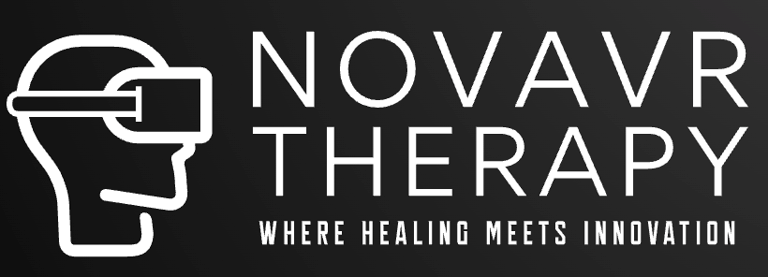Step into the future of counselling & psychotherapy in Ottawa with NovaVR’s immersive VR therapy. Call today for a free consultation: (613) 501- 2175
Harnessing Virtual Reality Exposure Therapy to Support Veterans with PTSD: A Comprehensive Review
One of the unique challenges faced by military personnel is the stigma surrounding mental health, which can hinder many from seeking necessary help. Cultural perceptions within military environments often encourage resilience and self-reliance, leading to feelings of shame or inadequacy in those who experience psychological distress. Consequently, many veterans may avoid seeking treatment due to fear of being perceived as weak or unfit for duty. As such, innovative therapeutic approaches are critical to address these challenges effectively.
NOVA VR THERAPY
Athem Houssein
2/10/20255 min read


Understanding PTSD in Veterans and Active Military Members
Post-Traumatic Stress Disorder (PTSD) is a significant mental health condition that affects a considerable number of veterans and active military personnel after exposure to traumatic events. Within military contexts, PTSD is often linked to combat experiences, sexual assault, and the loss of comrades. Studies from the Canadian Security Intelligence Service (CSIS) indicate that approximately 10% to 15% of veterans develop PTSD, with higher rates evident among those who have been directly involved in combat. These statistics highlight the pressing need for effective mental health interventions tailored to this unique demographic.
The symptoms of PTSD can be debilitating and typically manifest as intrusive memories, avoidance of reminders associated with the trauma, negative changes in mood, and heightened arousal. For veterans, these symptoms can severely disrupt daily life, affecting not only personal relationships but also professional aspirations and overall quality of life. Many veterans report struggling with reintegration into civilian life, often facing employment challenges, social isolation, and difficulties in maintaining personal relationships, creating a vicious cycle that exacerbates PTSD symptoms.
One of the unique challenges faced by military personnel is the stigma surrounding mental health, which can hinder many from seeking necessary help. Cultural perceptions within military environments often encourage resilience and self-reliance, leading to feelings of shame or inadequacy in those who experience psychological distress. Consequently, many veterans may avoid seeking treatment due to fear of being perceived as weak or unfit for duty. As such, innovative therapeutic approaches are critical to address these challenges effectively.
In light of the complexities surrounding PTSD in these individuals, it becomes increasingly clear that conventional treatments may not suffice for all. As research continues to explore advanced treatment modalities, options like Virtual Reality Exposure Therapy (VRET) emerge as promising alternatives designed to cater to the specific needs of veterans, ultimately enhancing their path toward recovery.
Virtual Reality Exposure Therapy: An Innovative Approach
Virtual Reality Exposure Therapy (VRET) represents a cutting-edge approach in the treatment of Post-Traumatic Stress Disorder (PTSD), particularly for veterans. This therapeutic technique utilises immersive virtual environments to simulate scenarios closely related to the traumatic experiences faced by individuals, allowing them to confront their fears in a controlled setting. Through the application of advanced technology, VRET creates realistic simulations of combat and trauma-related incidents, providing an opportunity for effective emotional processing.
The psychological foundation of VRET is rooted in exposure therapy, an evidence-based method whereby individuals gradually face their traumatic memories in a safe environment. The goal is to reduce the distress associated with these memories by facilitating repeated, controlled exposure. VRET enhances this traditional methodology by incorporating visual, auditory, and haptic stimuli that closely replicate real-world experiences. This multisensory engagement fosters deeper emotional connections and can lead to more significant therapeutic breakthroughs compared to conventional exposure techniques.
Numerous studies have underscored the effectiveness of VRET in treating veterans with PTSD. Research indicates that participants often experience reduced anxiety levels, improved emotional regulation, and enhanced coping mechanisms following VRET. For instance, a study by Rizzo et al. (2010) demonstrated substantial reductions in PTSD symptoms among veterans engaging in VRET, with outcomes showing greater efficacy compared to standard Cognitive Behavioral Therapy (CBT) approaches. Furthermore, a meta-analysis revealed that VRET not only enhances symptom relief but also accelerates the therapeutic process, providing quick and impactful results.
In comparison to traditional therapeutic methods, VRET offers unique advantages, including heightened engagement and a more profound emotional response. The immersive nature of VRET allows veterans to safely explore and address their trauma, making it a promising tool in their recovery journey. As research continues to validate its efficacy, VRET stands at the forefront of innovative treatments for PTSD, marking a significant advancement in mental health care for those who have served. This progressive approach has the potential to reshape therapeutic practices and improve the lives of countless veterans suffering from PTSD.
Evidence and Outcomes: The Impact of VRET on PTSD Treatment
Virtual Reality Exposure Therapy (VRET) has emerged as a promising tool in the treatment of PTSD among veterans and active military personnel. Research has demonstrated substantial evidence supporting the efficacy of VRET in reducing symptoms associated with post-traumatic stress disorder. According to a comprehensive meta-analysis published in the Journal of Anxiety Disorders, studies indicated that around 70% of participants who engaged in VRET reported significant improvements in their PTSD symptoms, notably in anxiety, avoidance behavior, and hyperarousal.
Governmental reports, including those from the Department of Veterans Affairs, have underscored the importance of innovative therapies like VRET. The VA reported that individuals undergoing VRET experienced reductions in their PTSD Checklist for DSM-5 (PCL-5) scores, demonstrating measurable improvements in their condition. Furthermore, peer-reviewed studies have found that VRET can actively facilitate the processing of traumatic memories through controlled exposure to virtual environments that mimic combat situations, significantly aiding in desensitization.
Case studies from organizations such as the VA have provided compelling insights into the transformative potential of VRET. For instance, one veteran, initially resistant to traditional therapies, reported a 60% decrease in PTSD symptoms after undergoing a specialized VRET program designed to recreate his combat experience. Testimonials reveal that participants often found this approach more engaging and less distressing than standard exposure therapy, leading to greater adherence to treatment protocols.
In addition to improving symptoms, VRET has also been shown to enhance overall quality of life for many users. By allowing veterans to confront their trauma in a controlled and safe environment, VRET not only aids in symptom management but also fosters personal growth and resilience. Overall, the evidence indicates that VRET is not just effective, but essential in the multi-faceted approach to treating PTSD in military populations.
Exploring NovaVR Therapy: Advances in PTSD Treatment
NovaVR Therapy stands out as a pioneering clinic in Canada that merges Virtual Reality Exposure Therapy (VRET) with established therapeutic practices to address the challenges faced by veterans with Post-Traumatic Stress Disorder (PTSD). Recognizing the unique experiences of veterans, the clinic adopts a holistic approach that combines innovative technology with personal interactions, tailoring treatment plans to meet individual needs. The philosophy at NovaVR Therapy emphasizes the integration of cutting-edge virtual technology alongside traditional therapeutic methods, ensuring a comprehensive understanding of each veteran's journey to recovery.
The clinic offers a range of therapies designed to enhance the healing process. Through the use of VRET, patients are gradually exposed to anxiety-inducing stimuli in a controlled virtual environment, allowing them to confront traumatic memories safely. This innovative method is complemented by cognitive-behavioral therapy (CBT), mindfulness practices, and supportive peer groups, fostering an atmosphere of trust and shared experiences. By combining these diverse therapeutic elements, NovaVR Therapy seeks to reinforce emotional resilience and facilitate meaningful connections among veterans, ultimately promoting healing and integration back into everyday life.
Moreover, the clinic values the importance of personal interaction in therapy, acknowledging that technology alone cannot replace the empathetic support of qualified professionals. Each participant is guided through their treatment journey by a dedicated therapist who provides essential support and personalized insight. This approach not only maximizes the efficacy of VRET but also helps veterans cultivate coping strategies that can be applied beyond the therapy sessions.
For veterans and their families seeking innovative treatments for PTSD, NovaVR Therapy serves as a valuable resource. We invite readers to explore the array of services offered, emphasizing the importance of taking the next step in the healing journey. By connecting with NovaVR Therapy, veterans can access personalized care that combines the best of technology and traditional methods, paving the way toward recovery and improved quality of life.


Athem Houssein
SOCIAL WORKER (MSW)
Rebecca Bates
SOcial Worker (MSW)
DeRoux Jones
Psychotherapist. (q)
Emily Light
Psychotherapist. (q)
Show You Care 💚
Whether you're a business, nonprofit, school, or agency, this is a simple, meaningful way to support mental health — without adding administrative burden. We'll provide everything you need to launch the benefit quickly and effectively.
You're Invited to Join the NovaVR Corporate Affiliate Program
Support your team’s mental well-being with exclusive access to discounted therapy services.
✅ Click the box below to confirm your interest and receive your corporate access package.


